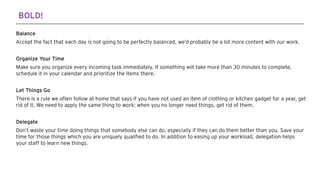Staying Focused While Working From Home
- 1. Staying Focused as You Work From Home Gopal Ananthanarayanan Iyer
- 2. Ongoing COVID-19 crisis 15,18,719 Total cases 88,502 Deaths As on 9th April 2020, 9:00 AM
- 3. 52% of global companies are taking steps to reconfigure supply chains in response to COVID 19 41% of global executives are investing in accelerating automation to manage the impact of COVID 19
- 4. Covid-19 is a health crisis and economic crisis – All at once
- 5. Emotions – What you feel now!
- 6. Amygdala Hijack What is Amygdala: Amygdala is responsible for the perception of emotions such as anger, fear, and sadness, as well as the controlling of aggression. Amygdala Hijack: The symptoms of amygdala hijack are due to the effects of the two stress hormones: cortisol and adrenaline. Both hormones are released from your adrenal glands to prepare your body to flee or fight. Stress hormones, primarily adrenaline, do a number of things you may not notice, including: • Relax your airways, opening them up so you can take in more oxygen • Increase the blood flow to your muscles for maximum speed and strength • Increase your blood sugar for more energy • Dilate your pupils to enhance your vision • Symptoms you may notice include: • Rapid heartbeat • Sweaty palms • Goosebumps on your skin. After amygdala hijack, you may feel regret or embarrassment because your behaviour may have been inappropriate or irrational.
- 8. • Activate your frontal cortex, the rational, logical part of your brain. This may take some practice and persistence. • Acknowledge that you feel threatened or stressed and that your fight-or-flight response has been activated. Become aware of how your emotions and body react to significant stress. Reviewing an episode after it’s over can help. • When you notice the fight-or-flight response has been activated, your goal is to calm down and take control. Remind yourself that what you’re feeling is an automatic response, not necessarily the best or most logical one. • When you’re calm, consciously engage your frontal lobes by thinking about the situation and finding a thoughtful, rational solution. • Become aware of your triggers and warning signs, and notice when they’re present. A good way to stay calm is to pay attention to your breathing. • Breathe slowly and evenly. Think about the speed and rhythm of your breaths, and focus on what’s going on in your body as you inhale and exhale. Stop the amygdala hijack
- 9. The crisis is the greatest blessing for people and nations, because the crisis brings progress. Creativity comes from anxiety as the day comes from the dark night. E 'in the crisis that is inventiveness, discoveries and great strategies. Who overcomes crisis overcomes himself without being 'passed'. Who gives the crisis its failures and difficulties, violent his own talent and gives more value to the solutions to the problems. The real crisis is the crisis of incompetence. 'Inconvenience of people and nations is the laziness in seeking solutions and ways out. Without crisis there are no challenges, without challenges life is a routine, a slow agony. Without crisis there is no merit. In crisis emerges the best of each, because without crisis all winds are only mild breezes. Talk of crisis means increasing it, and be silent in the crisis is to exalt conformism. Instead, we work hard. Let us stop, once and for all with the only dangerous crisis, which is the tragedy of not being willing to overcome." The crisis according to Albert Einstein
- 10. Coping with Fatigue, Fear, and Panic During a Crisis We are dealing with two contagions — the virus itself and the emotions it generates. Cultivate the capacity to observe our emotions, rather than being run by them. Calm yourself, regardless of what’s going on around you. A burst of jumping jacks, or running up and down stairs, is a rapid, reliable way to discharge stress and quiet the body and mind. 01 02 Tap into your adult self, deliberately choosing to focus on what you have the power to influence and letting go of the rest. 03
- 11. Stay Positive, Stay Focussed, Stay grounded • Limit your time on social media and watching the news. • Understand that stress is an unavoidable part of everybody’s life. • Create an action plan for work and home to help reduce and manage stress
- 12. Every Crisis is an Opportunity • Focus on Yourself! • Work from home is indeed possible • Opportunity to reimagine workplace relationships • Reimaging family time • Embracing Self Time • Solitude doesn’t mean being antisocial.
- 13. What this means for you Principles to consider in times of uncertainty Culture Productivity Learning Work From home. Connecting virtually. Reimagining Workplace Relationships Create a schedule Work life balance Managing time and stress. Coping mechanisms Upskilling E- learning and Skills development
- 14. Change
- 15. COVID has brought in Disruptive Change! In times of unanticipated change people are faced with not only the tasks of adapting to and moving past the change, but also the fear and uncertainty that comes with it. Not only can change be unlike anything we have ever experienced; it also results in a world where the future is very much unknown. With sudden change there is often a period of shock and denial. They key is how quickly can we get from Shock to Sustain!
- 16. Stay Focused When You’re Working from Home • Acknowledge, Accept & Adapt • Create a Ritual • Collaborate with family to create a schedule. Include everything – exercise, family time, work time, etc • Strictly stay off social media and other distractions during work. • Have a dedicated work space or area to work. • Take breaks every two hours for ten mins. • Talk, Talk, Talk – verbal communication helps in focusing on work. Try facetime once in a while to keep in touch. • Plan your day with your calendar to prioritize.
- 17. The Restorative Power of Ritual Rituals in the face of loss can help us feel less grief, rituals with families can make us feel closer, and rituals with our partners can reinforce our commitment to each other.
- 18. What’s your Ritual? • Start Work as Early as Possible or Work When You’re Most Productive • Dedicate Mornings to High-Value Work • Prepare For a Successful Morning in Advance • Structure Your Day As You Would Normally • Separate Work Zones From Relaxing Zones • Cancel Noise For Focus • Coffee meeting with colleagues • 30 minute workout • Family Time • Meditation • 40 minutes of self time. • Cooking with your wife/husband • Keep Socialising
- 19. Productivity
- 20. Keep your team organized and connected BOLD! • Balance • Organize your time • Let things go • Delegate
- 21. BOLD! Balance Accept the fact that each day is not going to be perfectly balanced, we’d probably be a lot more content with our work. Organize Your Time Make sure you organize every incoming task immediately. If something will take more than 30 minutes to complete, schedule it in your calendar and prioritize the items there. Let Things Go There is a rule we often follow at home that says if you have not used an item of clothing or kitchen gadget for a year, get rid of it. We need to apply the same thing to work: when you no longer need things, get rid of them. Delegate Don’t waste your time doing things that somebody else can do, especially if they can do them better than you. Save your time for those things which you are uniquely qualified to do. In addition to easing up your workload, delegation helps your staff to learn new things.
- 22. Action PointsStay Engaged and Productive THINK AHEAD — This can be a moment for strategic and long-term planning. • Updating budgets, timelines, risk plans, and other planning documents you plan to use going forward in your work. • Establishing updated metrics and goals that you can use to track progress. THINK BACK — “Quiet” times can be used to gather and examine data on previous initiatives, such as: • Encouraging your team to join you in reflecting on recent efforts by asking questions like: What has worked well for us in the past year and why? What hasn’t worked as well and why? This can translate into productive discussions related to future initiatives. THINK DEEP — Make a plan to do a deep dive into systems you currently have in place. This might include: • Spring cleaning" your email account, creating and organizing email folders. • Organizing and cleaning up folders, drives, Box, and other document storage.
- 23. Action PointsStay Engaged and Productive THINK ACROSS — Brainstorm ways that your work can impact others. This could include: • Offering your specialty or administrative services to units whose work touches yours. • Asking your colleagues what your team can do for them, both now and in the future. GROWTH — Downtimes are ideal for developing ourselves and our teams. Consider: • Encouraging employees to engage in professional development topics through free resources like LinkedIn Learning (accessible through the Pitt Portal), webinars, books, digitally available articles and other publications, podcasts, TED Talks, Massive Open Online Courses (MOOCs), etc. • Building discussions around professional development materials with your team. You might ask questions like: What did you learn from this? What surprised you? What does this make you more curious about? What insight does this bring to what we do? Based on this, what might we want to try?
- 24. Learning
- 25. Upskilling/Reskilling • Utilize the lockdown to upskill • Online courses for you and your family(even kids) • Online schooling is the next wave in e-learning.
- 26. Reasons to embrace e-Learning • Offer highly effective learning environments • Offer complementary interactive reinforcements that allow students to study 24/7 and work at their own pace • Direct feedback to trainers • Improve the image of your centre by offering technological solutions that solve real problems. • Available in any location, with an internet connection. • Sharable certifications for LinkedIn.
- 27. Questions???


























